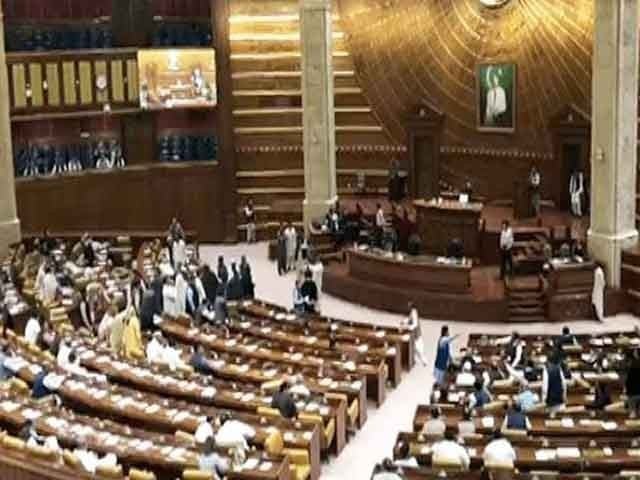Defamation bill bulldozed through PA amid fury

Opp questions govt’s high-handed approach without bringing stakeholders to the table
LAHORE: The Punjab Assembly bulldozed the controversial Defamation Bill 2024 into law on Monday, triggering a storm of protest from the opposition, who labelled it a “draconian law” and smelled a rat, suspecting it was aimed squarely at them.
The bill, which aims to crack down on defamation, was met with fierce resistance. However, the opposition’s amendments, including a request to send the bill to a special committee for ironing out loopholes, were shot down.
Labelling the bill a “draconian law,” the opposition questioned the government’s high-handed approach in ramming it through without bringing all stakeholders to the table. “Passing this bill is like establishing a parallel judicial system,” one lawmaker said.
Accusing the government of trying to muzzle dissent, opposition leaders argued that the bill would put a gag on free speech rather than safeguard it. While they conceded the need to tackle fake news, they argued that several provisions within the bill were a slap in the face of constitutional values.
Moreover, they argued that the procedure for passing this bill was far from fair as no stakeholders were consulted.
Addressing the House, Advocate General Punjab (AGP) Khalid Ishaq defended the contentious bill while dispelling “misconceptions” about the bill. He clarified that its purpose was to prevent the spread of false news and to deter individuals from tarnishing others’ reputations with incorrect information.
Ishaq explained the distinction between making false allegations and the true meaning of freedom of expression. He pointed out that under the bill, those who make allegations will now be required to provide evidence.
Sunni Ittehad Council (SIC)’s Opposition leader Ahmad Khan Bhachar strongly opposed the AGP’s stance on the procedure for judge appointments. He questioned why, if such a procedure exists, judges for the anti-terrorism court were still not being appointed.
He alleged that the Lahore High Court (LHC) appeared to be at the mercy of Chief Minister Maryam Nawaz.
He said it was astonishing that the government would be responsible for appointing the panel of judges.
He further alleged that the real aim of the defamation bill was to strip people of their right to freedom of speech, and proposed that the government should send the bill to a special committee rather than rushing it through.
Another opposition lawmaker, Nadeem Qureshi, declared it the “blackest day: in history, asserting that the government should focus on creating a wheat policy for farmers and working to reduce the prices of everyday commodities instead of harbouring grudges against the opposition.
At various points, the discussion on amendments and the bill veered off course as the opposition hurled accusations, calling the treasury’s leadership “dacoits and thieves.”In response, Provincial Minister Mian Mujtaba Shuja Ur Rehman fired back, saying that the real “thief” was PTI founding chairman Imran Khan, who is currently in jail.
SIC’s Junaid Afzal Sahi claimed that the defamation bill was being passed to tighten the noose around PTI. He argued that PTI leaders, workers, and supporters were first targeted on May 9 and will now be further persecuted through this bill.
The bill
The bill extends its reach across print, electronic, and social media platforms. It paves the way for defamation cases to be brought against the dissemination of false and fabricated news.Furthermore, the bill encompasses fake news circulated through various channels, including YouTube, TikTok, Twitter, Facebook, and Instagram.
Any news aimed at tarnishing an individual’s personal life or public standing will be subject to legal repercussions under this legislation.
According to the bill, individuals making allegations against those in constitutional positions may face a compensation of Rs3 million, with the high court bench empowered to adjudicate such cases.
Additionally, women and transgender women will be entitled to legal aid from the government’s legal team for assistance in their cases.
“Subject to the provisions of this Act and any other law for the time being in force, defamation shall be a civil wrong and the person defamed may initiate an action under this Act without proof of actual damage or loss and, where defamation is proved, General Damages shall be presumed to have been suffered by the person defamed,” the bill read.
It said that the government has the authority, through notification in the official gazette, to establish as many tribunals as deemed necessary to enforce jurisdiction under this Act. Each tribunal will have a designated member appointed by the government.
In cases where multiple tribunals are established, the notification will specify the territorial boundaries within which each Tribunal will operate.
The appointment of a member will be made by the government in consultation with the Chief Justice of the LHC. Eligibility for member appointment requires prior experience as a judge of the LHC, district judge, or qualification as an Advocate of the Supreme Court of Pakistan eligible for LHC judgeship.
Source: The Express Tribune
.


